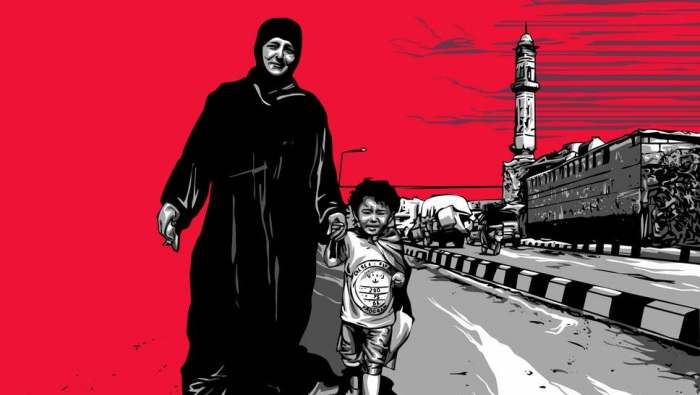Baladi News - Journals
Seven years into a civil war that has left devastation in its wake, campaigns and aid are beginning to dry up in Syria. The suffering of those still facing untold hardships fades from public view as the world moves on to the latest crisis.
Thousands are still displaced, living with limited access to basic necessities such as food, electricity and fuel. Unknown numbers are detained or missing.
Many of those left behind are women doing what they can to support their families, often mourning the loss of loved ones. Even though there are fewer battlefields, fighting continues, leaving civilians in mortal danger. The message from women in Syria rings clear: “I want you to feel our suffering.”
Nivin Hotary, a 38-year-old mother of two and former project manager and teacher, was displaced seven months ago to the Aleppo countryside by the Assad regime’s siege of eastern Ghouta.
Her former life “surrounded by close friends and family” was suddenly uprooted when Ghouta was besieged in 2012.
She says: “The hardest moment during the conflict was when a bomb would be dropped near my house and I wasn’t able to protect my children, even though I was holding them tight in my arms. I used to wish that my body was bigger and stronger to protect them from harm.”
Years later, her children now six and 12 years old, Nivin still has memories of “a weird smell in the air”, which she says she “knew was due to chemical weapons”. When the airstrikes hit, Nivin and her family would be forced to hide underground. “I’d have nightmares about my children being unable to breathe,” she adds.
The fears that come with being a mother displaced by war continue to shake Nivin’s life.
Her family now lives in Azaz, a town in the northern Aleppo countryside. But her new life is still full of complications and fear is never far away.
Ahlam, 51-year-old – who could not give her surname because she fears for the safety of her son, who is detained by the regime – lives in Idlib. She's a former maths teacher, and her husband, a former surgeon, have four children and several grandchildren in Idlib city. They used to live a busy, happy life, but when the fighting began, Ahlam says “no voice was heard but the voice of weapons”.
Common to many Syrian parents, Ahlam’s sons were taken, a subject she struggles to talk about. “My two sons were kidnapped by the regime’s military intelligence,” she says. Through tears, she adds: “Two days later my third son got arrested too during a protest at his university. Can you imagine losing your three sons within two days and not knowing their whereabouts for days?”
Two of her sons were released within three months and now live in Idlib, but her oldest has been in detention since February 2012. “I still don’t know his fate,” she says.
“The situation in Idlib is still unstable,” she says. “We buy clean water when it’s available and when we can afford it. We also pay a monthly subscription to get electricity for a few hours a day. When there’s electricity, you see people running around so fast to use washing machines, heaters and phone chargers before it’s cut again. When there’s electricity, it’s hard work time for mothers!”
In these challenging areas, it is women who are so often carrying the weight of responsibilities – and they want to be heard.
Source: The Independent.

